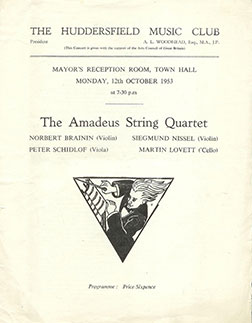An internet of musical events: InterMusE to compile a fascinating glimpse into music’s past
Posted on Thursday 25 February 2021

These souvenirs, referred to as ephemera, provide a record of the concert itself, while serving as a historical document reflecting society at the time of the performance.
Collaborative
A collaborative project launched by our Department of Music and funded by the Arts and Humanities Research Council aims to capture and unite these musical snapshots. The Internet of Musical Events: Digital Scholarship, Community, and the Archiving of Performances (InterMusE), will use the latest digital technology to create a fascinating online archive of concert ephemera, giving us a glimpse of musical performances delivered in communities across the UK over the past century.
Professor Rachel Cowgill leads the project with a team of musicologists, archivists, computer scientists, and performance providers from the University of York, the Borthwick Institute for Archives, the Computational Foundry at Swansea University, the British Library, and the University of Illinois at Urbana-Champaign.
The researchers will work with a range of concert materials held at the University of York’s Borthwick Institute, the Krannert Center for the Performing Arts at the University of Illinois at Urbana-Champaign, and the Linen Hall Library in Belfast. They will also explore archives held by the Royal College of Music and three former chapters of the British Music Society (est. 1918): Huddersfield Music Society, British Music Society of York, and Belfast Music Society.
Community
The materials held by these institutions will form case studies for exploring music’s role in community life over the past century, and will develop tools for data capture, visualisation and analysis to give performing arts organisations a rich understanding of their own musical histories and traditions as they plan for the future.
InterMusE will combine computational digital-archiving methods with more accessible, community-focused approaches to digitisation such as oral-history interviews, audience reminiscences, and citizen research. The digitised data will be used to create a series of online, open-access portals that can be linked with existing collections, resulting in a widely accessible digital archive of musical events, as well as a series of publications by the team.
Challenges
Professor Cowgill said: “InterMusE addresses some of the key challenges emerging for the arts and humanities in post-Covid times, investigating the mutually sustaining relationships between live music and communities and harnessing the capacity of digital technologies to enable collaboration and engagement with members of the public.”
Pamela Smith is the Concerts Manager at Belfast Music Society. She said: “Belfast Music Society has an unbroken record of chamber music provision in the city over the last 100 years, which is all the more remarkable given the troubled history of the region. We are very excited to be able to celebrate this legacy and, now, to enhance it by collaborating with the InterMusE team on this significant archival project.”

